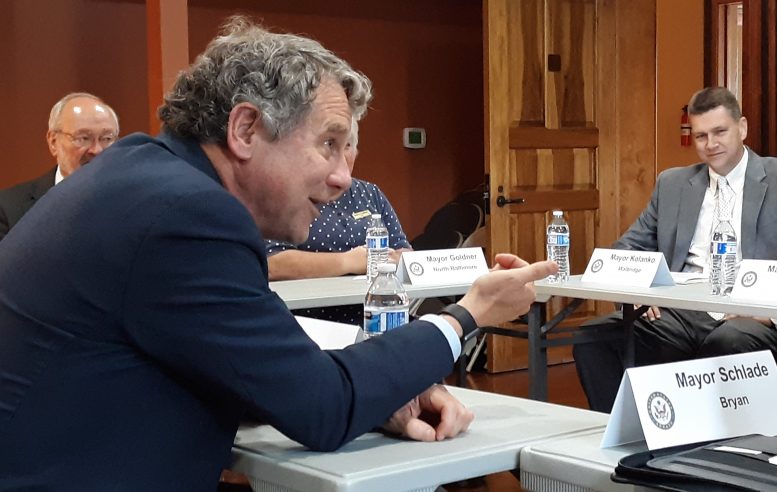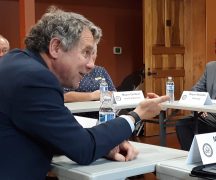By Susan Tebben
City officials are begging for help from the federal government to cover losses in every sector brought on by the COVID-19 pandemic.
Ohio Democratic U.S. Senator Sherrod Brown says he plans to bring legislation that would align with President Joe Biden’s comprehensive funding plan, and drive direct payments to municipalities across the state.
In a press conference, Brown brought along Youngstown Mayor Tito Brown and Athens Mayor Steve Patterson to explain why trusting the local governments to distribute the funding they need should be the way the country’s government is run.
Patterson said cities like Athens spent “every penny” of the CARES Act funding allocated to them, but direct funding “would untie those bound hands to be able to get money out the door, if it’s rent and mortgage relief, if it’s utilities, it’s child care.”
“Those are the things that rural communities are literally jonesing for,” Patterson said.
The plan, as Brown explained it, would create a fund to provide the direct federal assistance for lost revenues and increased costs due to COVID-19.
The fund would be split down the middle, with half going to towns, villages and cities, and the other half going to counties.
Brown said his team consulted with Biden when putting together the funding legislation, and that the funding would “fit exactly” with Biden’s plan, a $1.9 trillion bill that proposes a bump to unemployment aid, $25 billion in rental assistance and $5 billion each for utility bills and help with homelessness.
The Biden plan also proposes $350 billion for state and local governments for COVID-19 testing and vaccine distribution and help with reopening schools, plus a raise in the minimum wage to $15 an hour.
Local officials like Dayton Mayor Nan Whaley urged the support of the Biden plan on Tuesday, saying the money won’t just fill gaps, but make it possible for essential services to continue. Losses from the pandemic caused the city to institute a period “voluntary separation,” which led to the loss of 102 government workers.
“It happened faster and has gone a bit deeper than the previous recession that we had,” Whaley said.
Losing that many workers created holes in services all across the city, in services like housing inspection, the water department, and police and fire. Further losses from the pandemic have only exacerbated the losses.
“It means that we don’t have a police class this year in 2021, and we don’t have a fire class in 2021,” Whaley said. “Dayton was already low on police and firefighters, so this will mean slower service times.”
The legislation Brown is working on would be a formula, and counties would receive emergency fiscal assistance based on population.
Brown said he is of course hoping to get bipartisan support for his legislation, but will push the bill through budget reconciliation if necessary. Reconciliation is a process through which a bill only needs a simple majority to pass through, but the bill must be a policy that specifically changes spending or revenues.
“(Republicans) don’t want to spend the money on unemployment, on schools, on local government,” Brown said. “My job is to get it done, not to be nice to my colleagues and beg them.”


